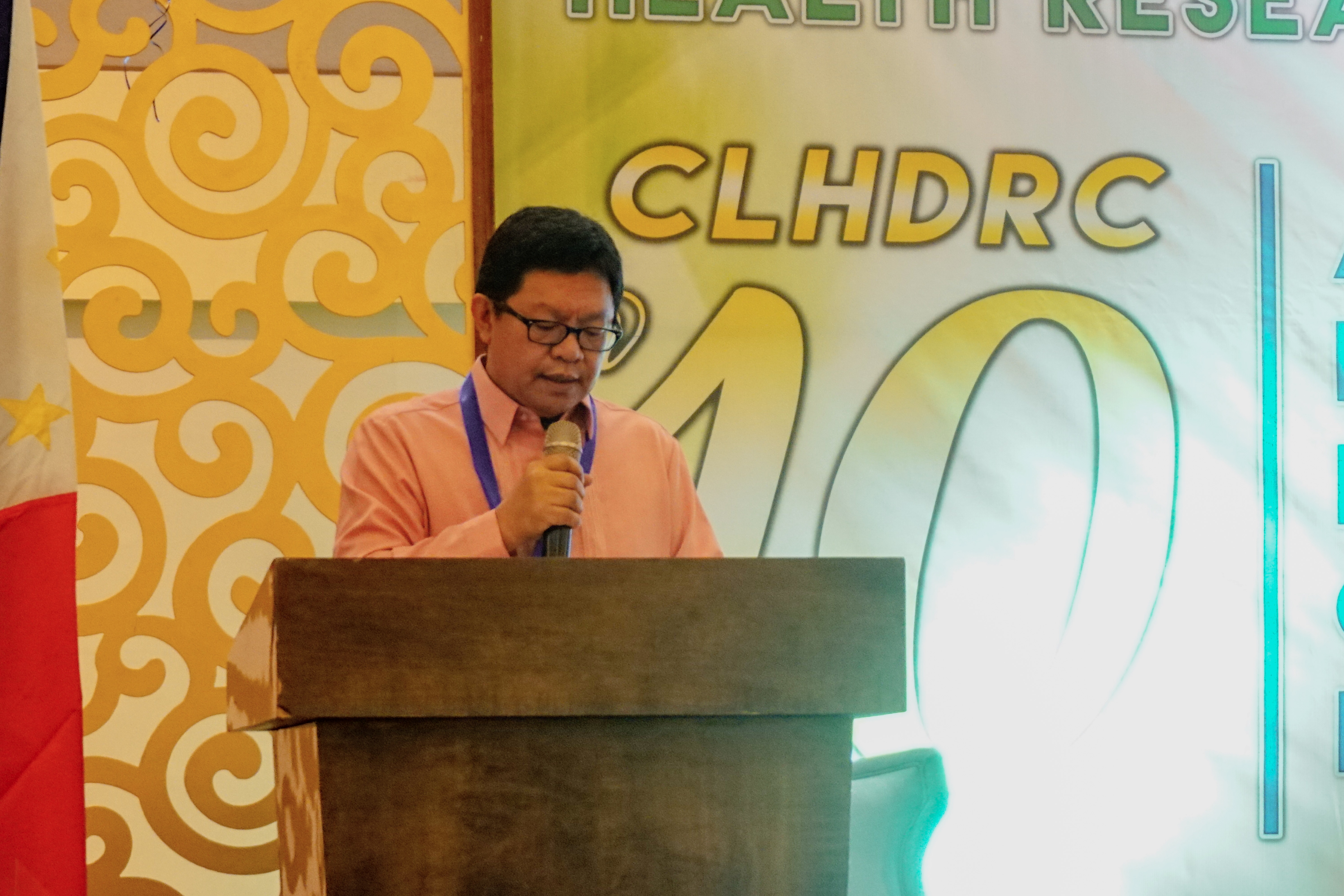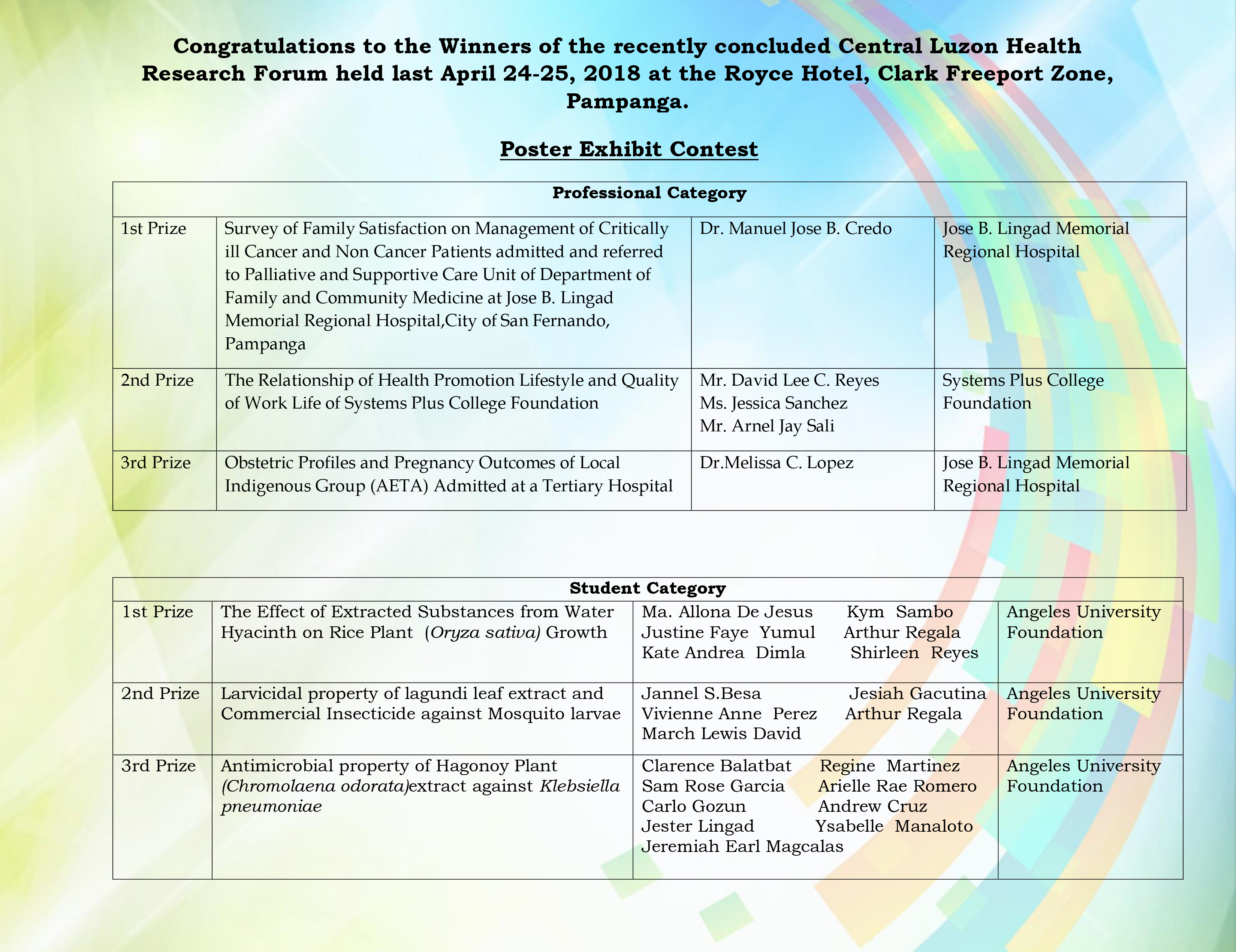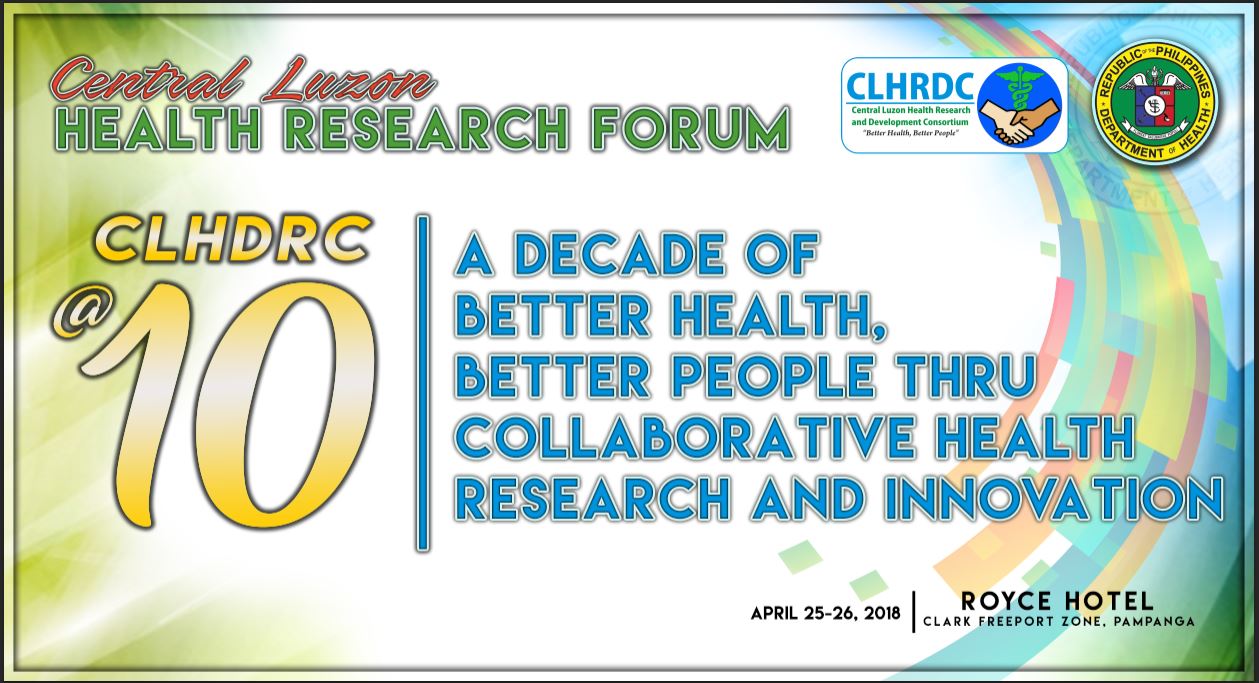- Details
- Category: Latest News
The Central Luzon Health Research and Development Consortium (CLHRDC) celebrated its 10th anniversary last April 25-26, 2018 at the Royce Hotel, Clark Freeport Zone, Pampanga, served as the highlight of the milestone event. The successful conduct of the 2nd Central Luzon Health Research Forum was organized in collaboration with the Department of Health-Regional Office 3 with the theme, "CLHRDC @ 10: A Decade of Better Health, Better People thru Collaborative Health Research and Innovations". The forum was conducted to link institutions engaged in or with interests in health research activities that could impact on regional as well as national health needs.
Fig. 1 Dr. Cesar Cassion delivered the welcome remarks
Dr. Cesar C. Cassion, Regional Director of DOH-RO3 mentioned in his speech during the forum that investment in Health Research and Development, means fostering innovation through creation or enhancement of public policies, including organizational standards, regulatory, procurement, and service delivery networks. He added that thru Fourmula 1 + it is envisioned that Filipinos will be the healthiest people in Southeast Asia by 2022 and Asia by 2040. This strategic thrust is expected to impact the populace favourably. Dr. Cassion also extended his deepest appreciation to CLHRDC for its leadership of collaborative health research initiatives in the past 10 years.
Mr. Paul Ernest N. De Leon, Chief SRS, Research and Development Management Division of PCHRD-DOST, read the message of Dr. Jaime Montoya, the Executive Director of the Philippine Council for Health Research and Development of the Department of Science and Technology (PCHRD-DOST). Mr. De Leon also spearheaded the launching of the National Unified Health Research Agenda 2017-2022. Mr. De Leon mentioned that the current NUHRA 2017-2022 was developed through bottom-up approach via the 17 regional consultations and top-down consultations via review of research agenda of individual government agencies and non-government organizations (NGOs).
Universal health care via FOURmula 1+ was presented by Dr. Maria Eloisa C. Vidar, Medical Officer IV of the DOHRO3. Dr. Vidar emphasized that FOURmula 1+ for health reforms are now packaged into four distinct components that include Health Service Delivery, Health Regulation, Health Finance and Good Governance in Health.
To promote ethically sound research outputs, Dr. Reynaldo DL. Bundalian Jr, Chair of the CLHRDC-RMC discussed the Health Research Regulatory Requirements for the guidance of the participants who attended the forum.
The forum was attended by more than 226 participants from higher education institutions, local government units, non-government organizations, and DOH-retained hospitals. Presentation of Completed Research Papers published in reputable journals and the CLHRDC's accomplished projects were presented.
As part of its commitment, the CLHRDC will continue to promote and strengthen collaboration that will enhance the research culture among member institutions that will help improve the well-being of the people in Central Luzon.
 Fig. 2 From left to right, Dr. Maila S. Rostrata (DOH RO3), Mr. Paul Ernest De Leon (PCHRD-DOST),
Fig. 2 From left to right, Dr. Maila S. Rostrata (DOH RO3), Mr. Paul Ernest De Leon (PCHRD-DOST),
Dr. Eloisa C. Vidar (DOH RO3), Dr. Reynaldo Bundalian, Jr. (AUF) and Dr. Jean N. Guillasper (NEUST)
- Details
- Category: Latest News
PURPOSE
The DOST-PCHRD Undergraduate Thesis Grant in Natural Products provides fund support to all undergraduate students who will conduct their thesis on natural products. The program aims to sustain a research culture in natural products to increase the number of research and later on build a pool of researchers/experts specializing in the field. The program supports he Drug Discovery and Development program of the Department of Science and Technology-Philippine Council for Health Research and Development (DOST-PCHRD) which aims to develop safe, effective and affordable alternative drugs from the country’s natural resources.
Thesis grants will be given to 2 undergraduate entries per region. After completion of the project, a competition will be held to selected qualified students to recognize innovative work on natural products.
NOMINATION PROCEDURES
1. Who can apply
All undergraduate students of Pharmacy, Chemistry, Nursing and Health and Allied Sciences who have thesis proposals on natural products may apply. The proposed thesis study must use plants indigenous in the region. The project must be completed a year after receiving the grant.
2. How to apply
Applicants should submit the following documents to the Regional Health Research and Development Consortium (RHRDC):
a) Duly accomplished prescribed research proposal form with college seal
b) Endorsement letter from the institution signed by the head of the university college dean
c) Soft copy of the proposal (word format)
d) Hard copy of the proposal using A4 paper (3 copies)
e) Certificate of plant authentication
f) Appropriate clearances:
Bureau of Animal Industry clearance for studies involving animal subjects
Biosafety Clearance for studies involving genetic engineering and pathogenic organisms
National Commission on Indigenous Peoples Clearance for studies involving Indigenous Peoples
Gratuitous Permit from Biodiversity Management Bureau for studies involving collection of flora and fauna from DENR Protected Areas
Ethical clearance for studies involving human subjects
g) Curriculum vitae of the students and adviser using the prescribed form
SELECTION CRITERIA
The research proposals will be rated based on the following criteria:
Proposal evaluation
1. Technical merit
• Objectives are specific, measurable, attainable, relevant and time-bound
• The study design supports the objectives
• The study sample and methodology are appropriate
2. Data management
• The plan for data collection is clearly described
• Quality control procedures for data collection are in place
• Statistical analysis is well described
3. Relevance/Significance
• The study addresses an important health problem
• The study contributes to the advancement of scientific knowledge
4. Proponent/institution’s capacity
• The investigators are qualified and appropriately trained to carry out the study
• The proposed study is appropriate to the experience level of the investigators
• The implementing/cooperating institution is capable of carrying out the proposed study
PROGRAM PROCESS

Deliberation of thesis grantees and winners will be based on the grading/rating during the en banc meeting and oral presentation, respectively.
SCREENING COMMITTEE MEMBERS
• Regional Health Research and Development Consortium - for prescreening
• UP Institute of Chemistry
• UST Research Center for the Natural Sciences
• DLSHSI Center for Biopharmaceutical Research
• Gruppo Medica Inc
• Herbanext Laboratories Inc.
THESIS GRANT
• Two (2) thesis proposals will be selected per region who will receive a grant amounting to a maximum of Fifty Thousand Pesos (P 50,000.00).
• The thesis fund will be deposited to the bank account of the thesis adviser and will be liquidated after the completion of the study
• A Memorandum of Agreement will be signed between the students, adviser, head of the institution and DOST-PCHRD
• The grant must be expended based on the approved line-item budget
CASH AWARD
After the oral presentation, fund support will be provided to the top 3 relevant and innovative thesis studies. Prizes will be distributed as follows:
|
Frist prize = P 30,000.00 |
P 20,000.00 for the student |
|
|
P 10,000.00 for the adviser |
|
Second prize = P 22,000.00 |
P 15,000.00 for the student |
|
|
P 7,000.00 for the adviser |
|
Third prize = P 15,000.00 |
P 10,000.00 for the student |
|
|
P 5,000.00 for the adviser |
|
Consolation prize |
P 5,000 per group |
Finalists will receive a plaque of recognition.
TIMETABLE OF ACTIVITIES
|
ACTIVITY |
TARGET DATE |
|
Dissemination and application of entries |
January to March |
|
Deadline of submission to the consortium |
end of May |
|
Deadline of submission to DOST-PCHRD |
2nd week of June |
|
Selection of thesis grantees by the Selection Committee |
June to July |
|
Conduct of study |
August to May of the succeeding year |
|
Submission of completed studies to DOST-PCHRD |
1st week of June of the succeeding year |
|
Selection of oral presentors by the Selection Committee |
June to July |
|
Oral Presentation and Announcement of Winners |
August |












